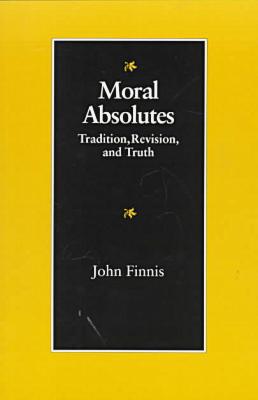

 |

|

The average rating for Moral Absolutes: Tradition, Revision and Truth based on 2 reviews is 2.5 stars.
Review # 1 was written on 2017-12-07 00:00:00 Robert Miller Robert MillerThis book is narrowly focused on the issue indicated in the title. Finnis compellingly defends both the centrality of moral absolutes within the Catholic tradition and the inherent difficulties of proportionalism. These difficulties stem from the impossibility of calculating the balance of pre-moral evils in a non-arbitrary way. But despite the compelling evidence regarding the presence of moral absolutes within the Catholic tradition, Finnis is somewhat selective in his reading of the tradition. Most perspicuously, he almost completely ignores casuistry. A focus on casuistry would illustrate an approach to moral inquiry that both takes seriously moral absolutes but also realizes that much care must employed in applying such absolutes. Finnis brushes over the significant variance in how moralists have approached the issue of application. This relates to the most fundamental problem of this book. Finnis fails to adequately address the question of what is required to accurately describe an action. He briefly asserts that action descriptions must include only that "description which makes them intelligibly attractive" but this is obviously inadequate since a thief can describe stealing property as 'increasing his assets;' likewise a murderer may describe killing a rival as 'decreasing the competition.' What is even worse, Finnis argues that the death penalty, traditionally supported by the Catholic tradition, cannot be interpreted in proportionalist terms as a matter of doing evil (killing) for a good purpose (justice) since Aquinas argues that the action of execution itself can be reinterpreted such that it is described as an act of "restoring the order of justice." But if actions can be redescribed like this, then the problem of moral absolutes is really the problem of how actions can be described but Finnis offers us nothing concerning this problem. Another problem concerns Finnis's interpretation of the first precept of the natural law. This is a precept that Finnis (correctly, in my opinion) grounds in action-theoretic terms as the requirement that actions be explained and justified in terms of their relationship to flourishing (see Rödl's compelling defense of this view in Self-Consciousness). But Finnis fails to heed the distinction between a formal account of flourishing rooted in action theory and a material account that is a matter of specifying the material content of flourishing. Thus by analyzing action we can understand its directedness toward a compete good but we can only grasp the content of such a good through much experience and in the light of a community's history. By failing to heed this distinction Finnis too easily draws conclusions about what is and what is not a component of human flourishing, and thus what is and is not a moral absolute, on the basis of an analysis of action. Despite these criticisms this is book that is well worth reading. |
Review # 2 was written on 2019-11-03 00:00:00 David Butler David ButlerI wanted to learn more about moral absolutes and see if there is any way I could learn about it independent from the religious context (although found out quickly that Finnis himself ties it to Catholicism quite a bit). I also wanted to challenge myself with a topic with which I disagree. Excited to learn, I picked up this book soon to find that it's written in the most tangled academic language hard to make sense of (especially the first chapter). I struggled through that, but it got better in the following chapters and I could follow the author a little better. There were a lot of parts where I could not situate the author's arguments under certain perspectives. I disagreed with the author a lot. A highly intellectual read, deeply philosophical and grounded in religion, I can now say that I learned a little more about moral absolutes and that I disagree with any absolutism even more now :) |
CAN'T FIND WHAT YOU'RE LOOKING FOR? CLICK HERE!!!